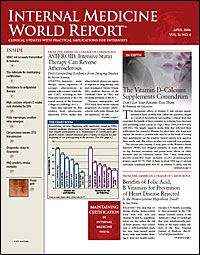Publication
Article
Internal Medicine World Report
IV Immunosuppressant Superior to Oral Therapy in Patients with Steroid-Dependent Ulcerative Colitis
In an investigator-blinded study ?published in Gut (2006;55:47-53), significantly more steroid-dependent ulcerative colitis patients who received intravenous (IV) azathioprine demonstrated clinical and endoscopic ?re?mission and were able to discontinue steroid therapy compared with patients taking the oral 5-aminosalicylic acid (5-ASA).
Included were 72 patients (27 men; mean age, 44 years) with steroid-dependent ulcerative colitis. Steroid dependence was defined as requiring Ž10 mg/day of steroid therapy during the previous 6 months, with at least 2 attempts at stopping it. All the patients were receiving systemic prednisone (Meticorten; 40 mg/d). Ulcerative colitis had to be clinically and endoscopically active at study entrance. Participants were randomized to either IV azathioprine (2 mg/kg daily) or oral 5-ASA (3.2 g/d) for a period of 6 months.
The primary outcome was clinical success, defined as initiation of clinical and endoscopic re?mission and steroid discontinuation; or failure, defined as a lack of clinical and endoscopic remission and continued steroid use, or colectomy.
Successful clinical and endoscopic remissions were reported in 53% of the patients in the azathioprine group compared with only 19% of those in the 5-ASA group (P = .006), for an absolute risk re?duction of 34% with azathioprine.
Azathioprine-treated patients also had greater improvements in the Powell-Tuck Index of clinical features (P = .01), the Baron Index of endoscopic findings (P <.001), and Physician Global Assessment score (P = .001), compared with baseline, over the 6-month study period.
Adverse effects, however, occurred more often in patients receiving azathioprine (26%) than in those taking 5-ASA (6%), and included decreased blood counts, increased transaminase levels, fever, headache, and abdominal pain. Nevertheless, most side effects in the azathioprine group resolved when the doses were reduced.
“Azathioprine is significantly more effective than 5-aminosalicylic acid in inducing clinical and endoscopic remission and avoiding steroid requirement in the treatment of steroid-dependent ulcerative colitis,” lead investigator S. Ardizzone, of L Sacco University Hospital, Milan, Italy, and colleagues conclude.—R.M.





